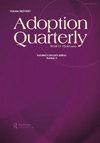宗教动机对收养家庭结构、父母管教和结果的预测作用
IF 0.6
Q3 SOCIAL WORK
引用次数: 7
摘要
摘要:本研究的目的是探讨宗教领养动机,以及这与家庭领养时所做的决定、坚定的纪律、依恋、父母的压力和情感,以及儿童的外化和内化之间的关系。在美国,44名被国际领养的儿童和他们的父母参与了这项为期六年的纵向研究。支持更大宗教动机的家庭收养年龄较大的孩子,家庭规模较大。控制了这些因素,更大的宗教动机也预示着更严格的纪律实践。宗教动机不能预测养育压力或父母的负面影响。此外,更大的家庭规模、更少的基线依恋干扰、更少的基线外化和内化——而不是宗教动机、坚定的纪律或两者之间的相互作用——最能预测积极的纵向儿童结果。本文章由计算机程序翻译,如有差异,请以英文原文为准。
Religious Motivation to Adopt as a Predictor of Adoptive Family Structure, Parental Discipline, and Outcomes
Abstract The purpose of this study was to examine religious motivation to adopt and how this relates to decisions families made while adopting, firm discipline, attachment, parent stress and affect, and child externalizing and internalizing. Within the United States, 44 internationally adopted children and their parents participated in this six-year, longitudinal study. Families endorsing greater religious motivation adopted older children and had larger family sizes. Controlling for these factors, greater religious motivation also predicted firmer discipline practices. Religious motivation did not predict parenting stress or parent negative affect. Additionally, positive longitudinal child outcomes were best predicted by larger family size, fewer baseline attachment disturbances, and less baseline externalizing and internalizing – rather than religious motivation, firm discipline, or the interaction between the two.
求助全文
通过发布文献求助,成功后即可免费获取论文全文。
去求助
来源期刊

Adoption Quarterly
SOCIAL WORK-
CiteScore
1.60
自引率
12.50%
发文量
3
期刊介绍:
Adoption Quarterly is an unparalleled forum for examining the issues of child care, of adoption as viewed from a lifespan perspective, and of the psychological and social meanings of the word "family." This international, multidisciplinary journal features conceptual and empirical work, commentaries, and book reviews from the fields of the social sciences, humanities, biological sciences, law, and social policy. In addition to examining ethical, biological, financial, social and psychological adoption issues, Adoption Quarterly addresses continuity in adoption issues that are important to both practitioners and researchers, such as: negotiation of birth and adoptive family contact.
 求助内容:
求助内容: 应助结果提醒方式:
应助结果提醒方式:


